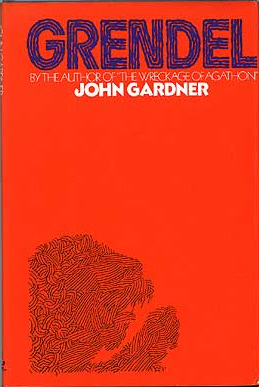 If there is one book that John Gardner is best known for, it would be Grendel. It was written in 1971, toward the beginning of his fiction writing career, although it is by no means his earliest work. The depth and clarity of the vision of Grendel, however, does not speak of a freshman effort. Prior to Grendel, nearly all of Gardner’s writing was academic non-fiction. Often, when an academic turns his hand toward fiction, the result is lackluster. (I’ve a feeling this is because the academic tends to try too consciously to be “literary.”) Grendel, however, is the exception that proves the rule, being a powerful look at the meaninglessness in modern society.
If there is one book that John Gardner is best known for, it would be Grendel. It was written in 1971, toward the beginning of his fiction writing career, although it is by no means his earliest work. The depth and clarity of the vision of Grendel, however, does not speak of a freshman effort. Prior to Grendel, nearly all of Gardner’s writing was academic non-fiction. Often, when an academic turns his hand toward fiction, the result is lackluster. (I’ve a feeling this is because the academic tends to try too consciously to be “literary.”) Grendel, however, is the exception that proves the rule, being a powerful look at the meaninglessness in modern society.
Grendel tells the backstory of the famous creature from Beowulf, following the monster from his youth to his death, which we are familiar with from the epic Old English poem. It is a short book, but Gardner manages to pack much into less than 200 pages. The story starts with Grendel carousing, eating what he may and reminiscing about his youth. Even here at the beginning of the novel, Grendel is already struck by the utter meaninglessness of his life. He tries to find import in the events and things around him, but there is very little for him to discover. As a result, his voice is tinged with ironic regret over what happens to him throughout his life.
Gardner follows Grendel through a number of events and explains how he ends up being the ravager of Heorot, which action ultimately leads to his death. Grendel is, however, not a book of plot, but a book of personality, and the person of Grendel shines forth.
There is a trend in much fiction that tells a story from the villain’s point of view to try to create sympathy for the villain. Gardner, however, does not do that with Grendel. The reader does come to understand Grendel a bit better; Grendel’s evilness is explained, but never is it justified, and therein lies the power of the novel. Grendel is not a monster, he is all mankind — and Grendel is not to be liked; pitied, maybe, but not liked. The meaninglessness that Grendel experiences thus becomes the pointlessness of much of modern society. It takes only a slight leap of the imagination to say that we are all like Grendel in some way, caught in a world we don’t fully understand with few points of reference to give it cohesion. As mankind is to Grendel, so is the world we have inherited to most of mankind: confusing and meaningless.
This is not, in itself, a book of hope. As we know, Grendel is killed at the hand of Beowulf, and Gardner’s Grendel dies not knowing exactly why the world is against him, only that it is. But I would still highly recommend this book. As Gene Wolfe said in a recent interview in Locus (September 2002), “The most important thing [about fiction] is that it assures readers that things need not be as they are now. In other words, the most important thing is hope.” Grendel by itself doesn’t point to that hope, but reading it does create a sense of hope — a sense of hope that points beyond the book to the reader himself. Grendel, then, can be read as a commentary on Beowulf — not some bleak assessment of all mankind, but an assessment that mankind can transcend the meaninglessness and find some internal reason for existence, for Beowulf slays Grendel.
(Random House, 1985)
